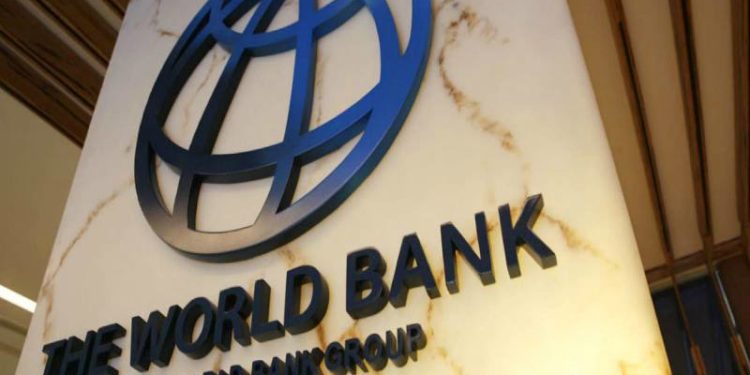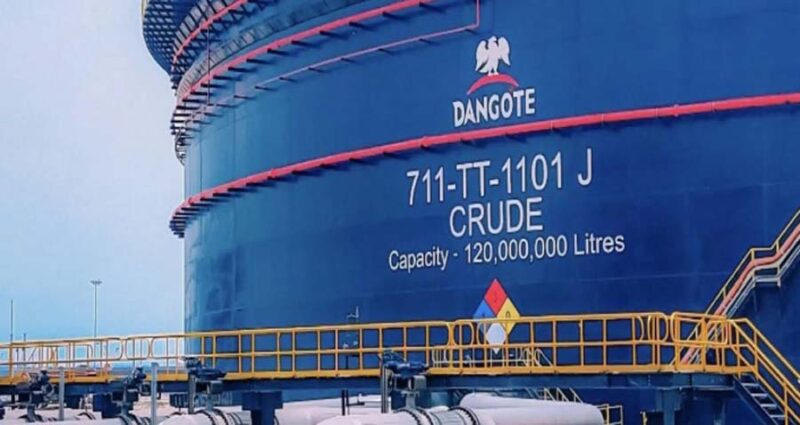Business
World Bank raises Nigeria’s GDP growth projection to 1.8%

The World Bank has increased Nigeria’s Gross Domestic Product growth forecast for 2021 to 1.8 per cent, which is higher by 0.7 per cent than its initial projection earlier this year.
The bank, in its June 2021 Global Economic Prospect just released, also forecast the GDP growth to hit 2.1 per cent for the country in 2022, compared with the 1.8 per cent it had predicted for Nigeria in the earlier report released in January.
Nigeria recorded a GDP growth rate of 0.51 per cent (year-on-year) in the first quarter of 2021, (Q1 2021) compared with the 0.11 per cent recorded in the fourth quarter (Q4) 2020, according to figures the National Bureau of Statistics released last month.
But the World Bank said its positive prediction for Nigeria was based on the expectation that crude oil prices would remain high as well as the government effecting structural reforms and flexible exchange rate management.
It said, “Growth in Nigeria is expected to resume at 1.8 per cent in 2021 and edge up to 2.1 per cent next year, assuming higher oil prices, structural oil sector reforms, and market-based flexible exchange rate management.”
The report stated that output in sub-Saharan Africa shrank at an estimated 2.4 per cent in 2020 as a result of the COVID-19 pandemic, a milder-than-expected recession.
It added that growth in the region has gradually resumed this year, which it stated was a reflection of positive spillover from strengthening global economic activity, including higher oil and metal prices, and some progress in containing COVID-19, especially in Western and Central Africa.
“The pandemic has contributed to wider budget deficits and a spike in government debt, heightening the risk of debt distress in some countries. Activity in the three largest economies—Angola, Nigeria, and South Africa— has partially recovered.
“Many industrial and agricultural commodity exporting countries experienced deep contractions last year. In tourism reliant countries, international arrivals have been at a near-halt, and tourism is likely to remain slow until wider vaccination permits safe reopening to international travel.
“Despite improvement, COVID-19 has continued to have adverse impacts on health, schooling, investment, and economic growth,” it stated.
According to the report, in some countries such as Angola and Nigeria, accommodative monetary and fiscal policies, currency depreciations, and rising food and energy prices “have stoked inflation.”
“Elsewhere (Kenya, South Africa), subdued demand has kept inflation in check,” it added.
The report noted that foreign direct investments in the region had been resilient, recouping about nine-tenths of their pre-pandemic levels, and workers’ remittances to the region have held up better than expected.
“Growth is forecast to resume to 2.8 per cent this year and firm to 3.3 per cent in 2022, underpinned by stronger external demand, mainly from China and the United States, higher commodity prices, and containment of COVID-19.
“Procurement and logistical challenges are expected to continue hobble the pace of vaccination despite the provision of vaccines by COVAX. Policy uncertainty and the lingering effects of the pandemic are expected to delay major investments in infrastructure and extractives and to weigh on the recovery (Central African Republic, Equatorial Guinea, Niger, Kenya).
“Per capita income levels in 2022 are expected to be four per cent lower on average than in 2019. Conditions in the region’s fragile and conflict-affected countries are expected to be particularly challenging; their average output level in 2022 is forecast to be 5.3 per cent below its size in 2019,” it said.
World Bank Group President, Mr David Malpass, said, “While there are welcome signs of global recovery, the pandemic continues to inflict poverty and inequality on people in developing countries around the world.”
Business
Naira loses N81 to dollar in one day

Naira loses N81 to dollar in one day
The naira lost N81.34 against the US dollar at the foreign exchange market on Thursday
FMDQ data showed that the naira fell to N1,154.08 per dollar on Thursday from N1,072.74 on Wednesday.
This represents a 7.04 per cent loss against the dollar compared to N1,072.74 per dollar traded the previous day.
At the parallel market, the naira also depreciated N1,100 per dollar on Thursday from N1, 040 on Wednesday.
This is the second time the naira would be depreciating against the dollar in three days amid fears of depleting foreign exchange reserves.
Nigeria’s foreign reserves dropped to $32.29 billion as of April 15.
Business
Govt paying N600bn for fuel subsidy monthly — Rainoil CEO

Govt paying N600bn for fuel subsidy monthly — Rainoil CEO
The CEO of Rainoil Limited, Gabriel Ogbechie, has claimed that the federal government resumed the payment of the controversial fuel subsidy following the devaluation of the Naira in the foreign exchange market.
Ogbechie made this statement on Tuesday during the Stanbic IBTC Energy and Infrastructure Breakfast Session held in Lagos.
He pointed out that with Nigeria’s daily fuel usage at 40 million liters and the foreign exchange rate at N1,300, the government’s subsidy per liter of fuel falls between N400 and N500, culminating in a monthly total of approximately N600 billion.
He said; “When Mr. President came in May last year, one of the things he said was that Subsidy is gone. And truly, the subsidy was gone, because immediately the price of fuel moved from 200 to 500 per liter. At that point truly, subsidy was gone.
“During that period, Dollar was exchanging for N460, but a few weeks later, the government devalued the exchange rate. And Dollar moved to about N750. At that point, subsidy was beginning to come back.
READ ALSO:
- North Central Support Group rejects Northern Elders, pledges allegiance to Asiwaju
- Gunmen kidnap 2 FRSC officers along Abakaliki-Enugu highway
- Driver killed, 16 passengers abducted on Abuja-Lokoja road
“The moment the two markets officially closed, officially the market went to about N1,300. At that point, that conversation was out of the window. Subsidy was fully back on petrol. If you want to know where petrol should be, just look at where diesel is. Diesel is about N1,300 and petrol is still selling for N600.
Furthermore, he said that NNPC being the only petrol importer in the country implies that there is an ongoing subsidy, as prices had to be fixed.
Earlier yesterday, the former governor of Kaduna State, Nasir El Rufai, said the federal government is spending more on petrol subsidy than before.
In addition, the Special Adviser to the President on Energy, Mrs. Olu Veŕheijen, said that the Federal Government reserves the right to pay fuel subsidy intermittently to cushion hardship in the country.
“The subsidy was removed on May 29. However, the government has the prerogative to maintain price stability to address social unrest. They reserve the right to intervene.
“If the government feels that it cannot continue to allow prices to fluctuate due to high inflation and exchange rates, the government reserves the right to intervene intermittently and that does not negate the fact that subsidy has been removed,” she said.
Govt paying N600bn for fuel subsidy monthly — Rainoil CEO
Business
Breaking: Dangote brings diesel price down to N1000/litre

Breaking: Dangote brings diesel price down to N1000/litre
Dangote Petroleum Refinery has announced a further reduction in the price of diesel.
When it commenced operation a few weeks ago, Dangote Petroleum Refinery pegged the price of diesel as N1,200.
While rolling out the products, the refinery supplied at a substantially reduced price of N1,200 per litre three weeks ago, representing over 30 percent reduction from the previous market price of about N1,600 per litre.
READ ALSO:
- Kano anti-corruption agency slams fresh charges against Ganduje
- Troops kill ISWAP Commanders, 30 other terrorists
- Ooni of Ife dismisses agitators of Yoruba nation
However, on Tuesday, a further reduction of N200 was noticed in the price, with the product now pegged at N1,000.
This significant reduction in the price of diesel, at Dangote Petroleum Refinery, is expected to positively affect all the spheres of the economy and ultimately reduce the high inflation rate in the country.
The President of Dangote Group, Aliko Dangote, had during the Eid-el-Fitr celebration said if the cost price of diesel comes down, the inflation rate will be substantially reduced.
Dangote spoke when he visited President Bola Tinubu in his residence in Lagos State to celebrate the end of the Ramadan fast with him.
Breaking: Dangote brings diesel price down to N1000/litre
-

 metro6 days ago
metro6 days agoTroops neutralise 188 terrorists, rescue 133 hostages in assault operations
-

 News6 days ago
News6 days agoFG gives update on where fleeing Binance executive is hiding
-

 Entertainment6 days ago
Entertainment6 days agoTolani Baj expresses love for Bobrisky
-

 metro6 days ago
metro6 days agoViral video: Edo CP orders trial of officer threatening people with gun
-

 News5 days ago
News5 days agoNLC, TUC jointly propose N615,000 new minimum wage
-

 News7 days ago
News7 days agoNew electricity tariff may drop if naira rebounds further – Adelabu
-

 metro7 days ago
metro7 days agoBreaking: Bobrisky sentenced to six months imprisonment without option of fine
-

 Business6 days ago
Business6 days agoNaira continues gain, sold N1,150/$ at parallel market






















